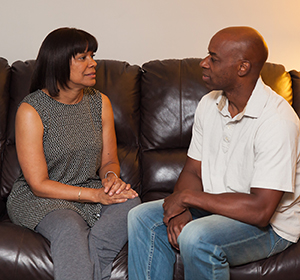A
B
C
D
E
F
G
H
I
J
K
L
M
N
O
P
Q
R
S
T
U
V
W
X
Y
Z
Topic IndexLibrary Index
Click a letter to see a list of conditions beginning with that letter.
Click 'Topic Index' to return to the index for the current topic.
Click 'Library Index' to return to the listing of all topics.
Talking About Pelvic Inflammatory Disease (PID)
If you have pelvic inflammatory disease, talking about it can be hard. But your health is at stake. If a recent sexually transmitted infection (STI) caused your PID, your partner must be tested and treated. If you've had PID for many years, you and your partner may now need to talk about problems such as infertility. In either case, start by telling your partner that you have been diagnosed with a serious health problem.
 |
| Protecting yourself from PID is just one of the good reasons to talk to your partner about safer sex. |
Who you should talk to
Once you’ve been diagnosed with PID, you should:
-
Talk with your current partner about getting tested and treated.
-
Discuss it with any partners you’ve had in the last 60 days. This is so they can get tested and not spread STIs to others.
-
Explain to any new partners about your sex history and about safer sex. You may find that a possible partner resists using condoms. Ask yourself if you really want to have sex with a person who may risk your health.
A note for teens
Talking with your parents about sex can be hard. But PID is a major health problem. You may not be able to handle it on your own. You may also have trouble getting medical care without your parents’ help. If you can’t talk with your parents about PID, go to another trusted adult. This may be a close family member or family friend. Or it may be a clergy member, therapist, or school guidance counselor.
If you’re in a committed relationship
Infertility is the most common result of PID. In fact, many females are first diagnosed with PID when they have trouble getting pregnant. If you now have fertility problems or other complications of PID, you were likely infected years ago. You may never even know how the infection started. PID is often caused by an STI. But that isn't the only cause. If you and your partner have sex only with each other, having PID doesn't mean that one of you is cheating. Keep these things in mind as you talk with your partner.
Online Medical Reviewer:
Donna Freeborn PhD CNM FNP
Online Medical Reviewer:
Heather M Trevino BSN RNC
Online Medical Reviewer:
Howard Goodman MD
Date Last Reviewed:
12/1/2022
© 2000-2024 The StayWell Company, LLC. All rights reserved. This information is not intended as a substitute for professional medical care. Always follow your healthcare professional's instructions.